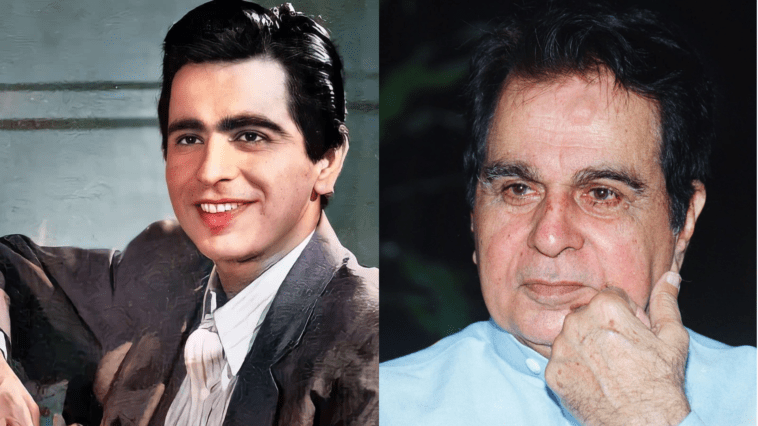Dilip Kumar, born as Muhammad Yusuf Khan on December 11, 1922, in Peshawar, British India (now Pakistan). He was a legendary Indian actor who left an indelible mark on the Indian film industry. He was widely regarded as one of the greatest actors in the history of Indian cinema. This earned him the moniker “Tragedy King” for his powerful and intense performances. With a career spanning over six decades, Dilip Kumar’s contribution to Indian cinema remains unparalleled. Let’s delve into the life and legacy of this iconic actor.
Early life of Dilip Kumar:
Khan went to the Barnes School in Deolali, which is now in the Indian state of Maharashtra. His father owned farms in Deolali. He grew up in Peshawar in the same area as Raj Kapoor, who was his childhood friend and later worked with him in the movie business. In 1940, he went to Pune and opened a store that sold dried fruits and a restaurant. Even though Khan’s family was from Peshawar, they chose to stay in Bombay after the Partition of India in 1947.
Khan never played under his real name. Instead, he used the name Dilip Kumar for the first time in 1944’s Jwar Bhata. In his book, Dilip Kumar: The Substance and the Shadow, he said that Devika Rani, one of the creators of Jwar Bhata, came up with the name. In a 1970 interview, he said that he gave himself this name because he was afraid of his father. His father never liked that he was an actor because films had a bad reputation at the time.
Dilip Kumar’s career:
Kumar’s first movie, Jwar Bhata, came out in 1944 and was not very well known. After two more movies that didn’t do well at the box office, his fourth movie, Jugnu (1947), in which he played with Noor Jehan, was his first big hit. Shaheed and Mela, both from 1948, were his next big hits. Both Jugnu and Shaheed were the most popular Hindi films of the year they came out.
In 1949, the movie Andaz by Mehboob Khan, in which he acted with Raj Kapoor and Nargis, was his big break.
Kumar’s most successful and productive decade was the 1950s, when he starred in several box office hits like Jogan (1950), Babul (1950), Deedar (1951), Tarana (1951), Daag (1952), Aan (1952), Uran Khatola (1955), Insaniyat (1955), Devdas (1955), Naya Daur (1957), Yahudi (1958), Madhumati (1958), and Paigham (1959). He worked with many of the best women of the time, such as Vyjayanthimala, Madhubala, Nargis, Nimmi, Meena Kumari, and Kamini Kaushal. Together with Raj Kapoor and Dev Anand, he ruled Hindi films in the 1950s. Which is known as the golden age of Hindi cinema. Even though they never were in the same movie, Kumar was in Andaz (1949) with Raj Kapoor and Insaniyat with Dev Anand.
He became known as the “Tragedy King” because of a few of his pictures. Dilip Kumar was depressed briefly because he played so many sad parts. On the advice of his therapist, he also played funny roles. In Mehboob Khan’s 1952 show with a big budget and an exciting plot, Aan, he played one of his first comedic parts. It was also his first movie to be shot in technicolor. Aan was the first Indian movie to be shown widely in Europe. It opened with a big party in London. At the time, Aan was the most successful Indian movie ever at home and abroad. In the hit comedy Azaad (1955), he played a thief, which gave him more success.
By this time, he had developed his unique, signature way of acting, which consisted of mumbling his lines and giving them many different faces and meanings.
He won the Filmfare Best Actor Award for the first time (for Daag) and went on to win it seven more times. from 1950 to 1960 he made 21 films, and 9 of them were in the top 30 highest-grossing pictures of the decade.
In the 1950s, Kumar was the first Indian star to charge 1 lakh (1.1 crore or US$130,000 in 2023) per movie.
During his career, Dilip Kumar worked with some of the finest directors and actors of his time. He collaborated with legendary filmmaker Bimal Roy in films like “Madhumati” (1958) and “Devdas,” which won him several accolades. His pairing with actress Vyjayanthimala was highly acclaimed, and they shared great on-screen chemistry in films like “Devdas” and “Gunga Jumna.”
Dilip Kumar’s late career:
In the 1970s, Dilip Kumar experimented with more diverse roles, showcasing his versatility as an actor. He starred in movies like “Ram Aur Shyam” (1967), “Shakti” (1982), and “Karma” (1986), where he portrayed characters with shades of gray. Despite being known for his dramatic roles, Dilip Kumar also showcased his comedic timing in films like “Kohinoor” (1960) and “Sagina” (1974).
Apart from his acting prowess, Dilip Kumar was also known for his professionalism and dedication to his craft. He was deeply involved in the creative process of his films and often contributed to the screenplay and dialogues. Dilip Kumar’s commitment to excellence earned him numerous awards and accolades, including eight Filmfare Awards for Best Actor, the highest recognition in Indian cinema.
In the 1980s, Dilip Kumar gradually reduced his film appearances but continued to make a lasting impact with his performances. His last film as a lead actor was “Qila” (1998). However, he made special appearances in movies like “Krantiveer” (1994) and “Umar” (2006).
Despite his success, Dilip Kumar faced personal challenges and setbacks. He had a tumultuous relationship with actress Madhubala, whom he was briefly engaged to. However, they separated due to various issues. In 1966, he married actress Saira Banu, who stood by his side throughout his life.
Dilip Kumar: The Legend
Beyond his acting career, Dilip Kumar was also involved in various social and humanitarian causes. He actively participated in fundraising events and donated generously to charitable organizations. His contributions to society earned him recognition and awards, including the Padma Bhushan, India’s third-highest civilian award.
Dilip Kumar’s influence on Indian cinema is immeasurable. He set new benchmarks for acting and inspired generations of actors to push the boundaries of their craft. His performances continue to be studied and celebrated by actors, critics, and audiences alike. Dilip Kumar’s remarkable journey came to an end on July 7, 2021, when he passed away at the age of 98, leaving behind a rich cinematic legacy that will be cherished for generations to come.
Indian Punjabi Actor Gippy Grewal To Shoot Next Film in Lahore
Dilip Kumar’s life is a testament to his immense talent, dedication, and contribution to Indian cinema. His iconic performances, versatility, and commitment to excellence have made him an eternal legend in the history of Indian cinema. As fans and admirers, we will forever remember him as the “Tragedy King” and a true icon of Indian cinema
FAQ's related to Dilip Kumar
Real name of Dilip Kumar?
The real name of Dilip Kumar was Mohammed Yusuf Khan. He was born on 11 December 1922 in Peshawar.
Who was Dilip kumar's wife?
Dilip Kumar was married twice. Once to Saira Banu from 1966 till his death. He also married Asma Rehman in 1981 but they got divorced in 1983.
Dilip Kumar Net worth?
At the time of his death, Dilip Kumar had an estimated net worth of $85 million.
Did Dilip Kumar have any kids?
No, Dilip Kumar and Saira Banu had no Kids and no regrets about it. In a 2012 interview with Hindustan Times, Dilip Kumar revealed that it would have been great if they had their own kids but since they did not, he has no regrets.





